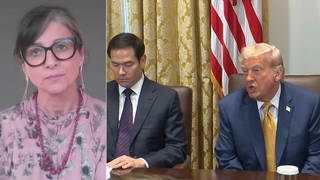
2001 was a year that saw the world’s richest country attacking one of the world’s poorest countries. Since October, thousands of Afghans have perished at the hands of U.S. bombs. The country remains littered with unexploded cluster munitions, some of which are identical in color to the Pentagon’s so-called humanitarian food rations. In Kabul, a new Washington-backed government has replaced the Taliban. This government, hailed as the first step toward a democratic Afghanistan, is made up largely of warlords, many of them documented human rights violators, some of them accused by major human rights groups of conducting mass executions of thousands of civilians over the last decade. And despite the change of government to one publicly favored by Washington, the U.S. bombing continues. Just this past weekend, U.S. warplanes attacked villages in eastern Afghanistan, reportedly killing some 100 civilians.
These victims in the Bush administration’s war against the world join the more than 4,000 civilians killed in the U.S. attacks. But, according to almost every source in the media and government, Taliban leader Mullah Mohammed Omar is still alive. Osama bin Laden recently appeared in yet another video. Though, of course, Bush did not say that the killing of thousands of civilians in Afghanistan was one of the goals of his so-called war on terror, it seems to be what he’s been most successful at doing.
Today on Democracy Now! we are going to kick off this new year by looking more closely at the Bush administration’s war on the world and what it might bring in 2002. We have two speeches. Later in the program, we’ll hear from professor Edward Said. But first we turn to professor Noam Chomsky, scholar, activist and author, speaking at a conference sponsored by the American Friends Service Committee in early December. His most recent book is “9-11,” on the September 11 attacks, the new war on terrorism, media control and the long-term implications of America’s military attacks abroad.
Transcript
AMY GOODMAN: Welcome to The War and Peace Report, broadcasting just blocks from the first ground zero. Afghanistan is the second. I’m Amy Goodman. Happy New Year.
2001 was a year that saw the world’s richest country attacking one of the world’s poorest. Since October, thousands of Afghans have perished at the hands of U.S. bombs. The country remains littered with unexploded cluster munitions, some of which are identical in color to the Pentagon’s so-called humanitarian food rations, so when kids run out to grab some food, they don’t know whether it’s a cluster bomb.
In Kabul, a new Washington-backed government has replaced the Taliban. This government, hailed as the first step toward a democratic Afghanistan, is made up largely of warlords, many of them documented human rights violators, some of them accused by major human rights groups of conducting mass executions of thousands of civilians over the last decade.
And despite the change of government to one publicly favored by Washington, the U.S. bombing continues. Just this past weekend, U.S. warplanes attacked villages in eastern Afghanistan, reportedly killing some 100 civilians. These victims in the Bush administration’s war against Afghanistan join the more than 4,000 civilians killed in U.S. attacks. But according to almost every source in the media and government, Taliban leader Mullah Mohammed Omar is still alive. Osama bin Laden recently appeared on yet another video, while the Bush administration continues to admit it has no clue of where he is. Though George Bush did not say that killing of thousands of civilians in Afghanistan is one of the goals of a so-called war on terror, it seems to be what he’s most successful doing.
Today on The War and Peace Report, we’re going to kick off this new year by looking more closely at the Bush administration’s war on the world and what it might bring in 2002. We have two speeches. We will go to professor Edward Said, but first to Noam Chomsky.
NOAM CHOMSKY: Another consequence of the collapse of the deterrent is that there’s no space left for independence and nonalignment. And, in fact, the Non-Aligned Movement essentially collapsed at that point. One indication of the collapse of this concern is the very sharp decline in foreign aid in the decade that followed — in the United States, declined to virtually zero. There’s no longer any need for, essentially, propaganda purposes.
And the effects of this were recognized very quickly. So, President Mahathir of Malaysia, for example, pointed out right away; he said, “Paradoxically, the greatest catastrophe for us, who had always been anti-communist, is the defeat of communism. The end of the Cold War has deprived us of the only leverage we had — the option to defect. Now we can turn to no one.” And there is, furthermore, no deterrent. And those fears were expressed very clearly throughout the South.
The Gulf War, which followed very quickly, was bitterly condemned throughout the South as a needless show of force designed to demonstrate that “What we say goes.” Recall George Bush’s words as the bombs and the missiles were falling. In this case, too, there’s good reason to suppose that there were peaceful alternatives. Diplomatic alternatives were available. And there’s, in fact, good reason to suppose that the Bush administration feared that they might become difficult to suppress. Media cooperated nicely.
The general mood in the South at that time was captured rather well by Cardinal Arns, Cardinal Paulo Evaristo Arns, of São Paulo, Brazil. He said that — correctly, that in the Arab countries, “the rich sided with the U.S. government while the millions of poor condemned this military aggression” — joining the ignored Iraqi opposition, he could have added. Throughout the Third World, he continued, “there is hatred and fear: When will they decide to invade us?” And on what pretext?
Well, the reaction to the bombing of Serbia was very much the same throughout the world. Again, there’s quite compelling evidence that peaceful options were available that might have spared plenty of misery. But it was bitterly condemned throughout the world, even in U.S. allies, U.S. client states, like Israel. Leading military analysts simply dismissed it as a show of — return to the gunboat diplomacy of the last century, cloaked by the same hypocrisy.
Well, Americans are very carefully protected from any of this. We’re protected from world opinion and protected from critical discussion. So you have to really work to find out any of these things. But we don’t do ourselves any favors by keeping to these restrictions.
And we also do ourselves no favors by ignoring the public documents that explain very clearly the thinking of planners about the world that they’re creating and they have overwhelming power to create. They understand very well, as we should, that the world is what’s called tripolar in economic terms — that is, there are roughly comparable centers of economic power in Asia, Europe and North America — but the world is radically unipolar in the capacity to destroy, to resort to violence and destroy.
The United States already outspends the next 15 countries for what’s called defense. And “defense,” as always, means offense. And it’s far ahead in military technology. And the current plans, as you all know, are to sharply increase that disparity. That includes extending the arms race into space, which means demolishing the out space treaty that’s been observed since 1967. Ballistic missile defense is only a small part of this. And even that is well understood to be an offensive weapon, not a defensive weapon. It’s understood by adversaries. It’s understood by strategic analysts here. So, the RAND Corporation, for example, describes the BMD as an “enabler of action,” not a shield. Strategic analysts say the same thing. In fact, they applaud the program typically as a means to establish U.S. global hegemony, and they explain that that’s what the world needs. I won’t quote it, since I’ve just been warned to shut up. But it’s interesting comments, which have many — they just mimic many predecessors. You know, all of this is totally familiar for hundreds of years.
They’re also — they explain very clearly that — the far broader program of militarization of space, that’s also explained very clearly and quite intelligently in perfectly public documents, no reason not to know them. They point out that this — the Space Command, that this is the natural next step in expanding state power. So, armies and then navies were established in order to protect commercial interests and investment. And the next obvious frontier is space for the same reasons: to protect commercial interests and investment. However, they point out, there’s going to be a difference this time. The British had a huge Navy for that purpose, but it was possible to counter it: Germany could have developed a navy — don’t have to talk about the consequences. This case is going to be different. This arms race is going to have only one competitor running, just like now, and there will be a sole hegemon. The United States is going to be so awesomely powerful that there won’t be any counterforce.
That’s, first of all, necessary for just plain technical reasons. The whole space war system is based on satellites, and satellites are very easy to shoot down. They’re not like missiles. So you have to make sure that no adversary has the poor man’s weapon: anti-satellite weapons. And that requires overwhelming dominance of space, which is understood and intended. And there’s another reason. The other reason is that what they call globalization is expected to lead to a widening divide between the haves and the have-nots. That’s an assessment that’s shared by U.S. intelligence and others. Notice that’s contrary to the theories that you’re supposed to believe in, but it’s quite in accord with practice. And it’s going to be necessary, they conclude, reasonably, to control the unruly elements. How do you do that? Well, by inspiring fear or by actual use of highly destructive killing machines launched from space, laser weapons, probably nuclear-powered, on a hair-trigger automated alert system, which is a virtual guarantee of what are called “normal accidents,” meaning the kinds of accidents that will always take place unpredictably in complex systems.
It’s recognized that these programs significantly increase the danger of unimaginable catastrophe, but that too is entirely rational. It’s important to recognize that. It’s entirely rational within the framework of prevailing institutions and ideology. The principle is that hegemony just ranks a lot higher than survival. There’s ample precedents for that right through the Cold War, easy to give examples, and well before. The only difference is that by now the stakes are far higher: the survival of the species. And that’s no exaggeration.
Well, these are some of the prospects if current tendencies persist. But there is no reason at all for this to happen. There is good news. The good news is that the reigning system of authority is very fragile, and they know it. There’s a major effort right now, as you’re aware, to exploit the current mood of anguish and fear in order to ram through harsh, regressive, dangerous programs — militarization of space is only one — and in order to — and it’s being used to deflect the mass popular movements that have been taking shape in unprecedented and highly encouraging ways. But there’s no reason at all to succumb to those efforts. There’s every reason not to. There are plenty of choices and options available. What’s needed, as always, is will and dedication to pursue them.
AMY GOODMAN: Professor Noam Chomsky. He teaches linguistics at the Massachusetts Institute of Technology. And his latest, among many, is 9-11. And, by the way, if you want to get a copy of this videotape, that includes the upcoming speaker, Edward Said, as well as John Ross talking about the Zapatistas, you can call 1-800-926-3921 for a videotape of all three on this New Year’s. 1-800-926-3921.
As we turn now to professor Edward Said, who recently gave a speech in the middle of the U.S. bombing of Afghanistan. Again, we were talking about the numbers, more than 4,000 civilians killed in the U.S. attacks on Afghanistan. If these numbers shock you, it may be because the University of New Hampshire professor Marc Herold, who’s documenting the death toll, his report has been kept off the pages of U.S. media. I believe it’s only been reported in The Guardian newspaper in London. They’ve covered these findings. And if you want to go to our website at democracynow.org — that’s democracynow.org — you’ll see the latest report. We are going go to professor Said after a break for stations to identify themselves. You’re listening to The War and Peace Report. Stay with us.













Media Options